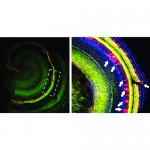 Sonia M. Rocha-Sanchez, PhD, professor of Oral Biology and dean of Research at Creighton University School of Dentistry along with faculty members and colleagues, Shikha Tarang, MS, PhD, assistant professor of Oral Biology, Umesh Pyakurel, dental class of 2023 and Michael Weston, MA, PhD, assistant professor of Oral Biology published an article in European Journal, Hearing Research, regarding their research on, “Spatiotemporally controlled overexpression of cyclin D1 triggers generation of supernumerary cells in the postnatal mouse inner ear.”
Sonia M. Rocha-Sanchez, PhD, professor of Oral Biology and dean of Research at Creighton University School of Dentistry along with faculty members and colleagues, Shikha Tarang, MS, PhD, assistant professor of Oral Biology, Umesh Pyakurel, dental class of 2023 and Michael Weston, MA, PhD, assistant professor of Oral Biology published an article in European Journal, Hearing Research, regarding their research on, “Spatiotemporally controlled overexpression of cyclin D1 triggers generation of supernumerary cells in the postnatal mouse inner ear.”
Humans are born with a limited number of sensory auditory hair cells, which are intended to last for our lifetime but are extremely susceptive to harm and loss due to environmental (e.g., noise exposure, chemical damage, aging) and genetic insults. Consequently, the loss of those sensory cells is always permanent and cannot be naturally repaired.
In non-mammalian, non-human vertebrates (e.g., fish birds, reptiles, and amphibians), loss of sensory hair cells is compensated by a group of auditory, non-sensory cells known as supporting cells. Upon cell division, those supporting cells differentiate into new sensory hair cells, which function just like the original ones.
Through genetic manipulation, the research team has generated a mouse model that, upon administration of a low dose antibiotic in drinking water, overexpress the Cyclin D1 gene, which is known to regulate the cells’ ability to divide and proliferate, but is usually dormant (down-regulated) in the postnatal inner ear.

